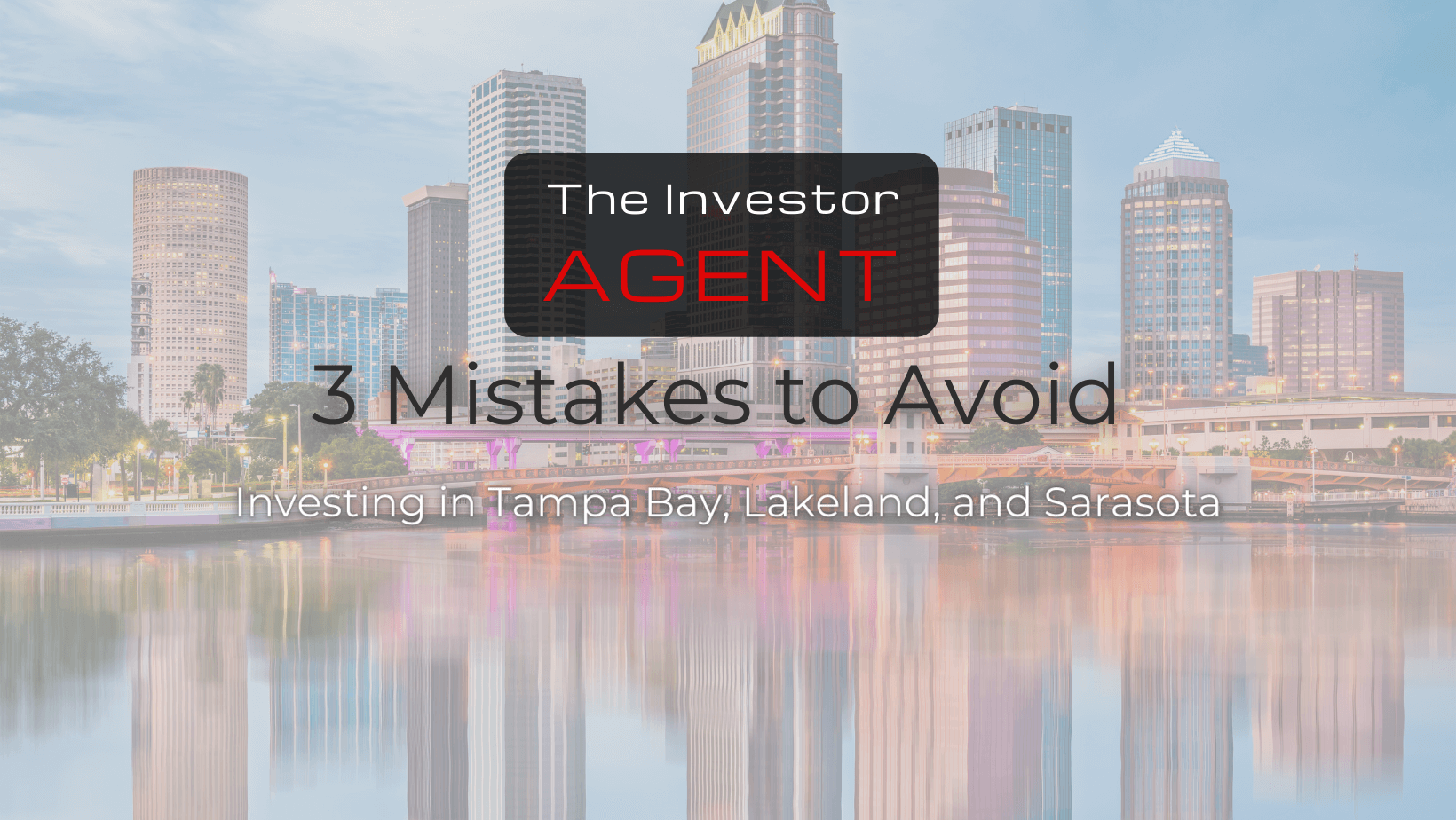There are some mistakes you can carry over from Detroit to Nashville, but not all mistakes are possible to make in one area. Investing in Tampa’s real estate market can be a lucrative move, but it’s not without its pitfalls. As an experienced broker, I’ve seen investors make a few common mistakes that can significantly impact their returns. In this post, we’ll explore three key mistakes to avoid so your investment journey in Tampa is not the fourth mistake.
Overlooking Market Research
One of the biggest mistakes investors make is not doing their homework on the local market. Tampa’s real estate landscape is diverse and constantly evolving with money coming in to new areas and large developments in the works. Before diving in, it’s crucial to understand factors like who is your tenant pool, school district ratings, commute times to some top employers, and local jobs in the area. Additionally, staying updated on rental demand trends and property value fluctuations in different parts of Tampa will help you make more informed decisions.
One very insightful tip can be looking at the businesses in the area. Is there a Chick-fil-a? A Wholefoods or Trader Joes? Or are we talking Cricket Wireless and Popeyes? Many corporations spend millions per year on a real estate team who dive into analytics, history, and projections of zip codes. They look at metrics most of us wouldn’t think about. Take advantage of this like CVS does by putting one next to every Walgreens after Walgreens spends a million on market research.
Underestimating Expenses
Forget about the potential of estimating rents too high.. Many investors get caught up in the potential revenue from rental properties and overlook the full range of expenses. Owning a rental property in Tampa isn’t just about the mortgage payments. You also need to budget for regular maintenance, property management fees (if you’re not self-managing), insurance premiums, and property taxes. Failing to account for these expenses can lead to unexpected financial strain and diminish your investment returns. Failing to account for the FULL amount will lead to the same result.
Property taxes for example, every county has a property appraiser website where you can, for free, type in an address and purchase price and get an estimated annual tax. Using this instead of your sellers 20 year old tax rate will help you spot the difference from 2k/year to 8k/year. Florida has high property taxes because there is no state income tax.
Insurance is the same thing but to a lesser degree. Have an agent on hand able to comp out a quote. Know if you’re in a flood zone or not.
Line up a property manager early on and understand what their fees are. Most are pretty cut and dry with a monthly percentage of rent and a tenant placement fee. Other have miscellaneous charges, renewal fees, etc. I’m not say interview 5 property managers before you even have a property under contract, but ask your realtor or call a couple PMs up and have a short casual conversation early on.
What are your reserves set aside from each month of rent? Tampa gets a lot of rain but no snow and very rare and short lived freezes. This is totally different from the midwest for example. The future repairs are going to look different over time and cost can be different from what you expect. The biggest issues are mold and termites. Unless you have a block house, you just can’t get away from those two problems constantly at the door.. waiting for you to postpone that pest control treatment just once.
Ignoring Tenant Quality
A common mistake I’ve observed is investors rushing to fill vacancies without properly vetting tenants. High-quality tenants are essential for maintaining consistent rental income and taking good care of your property. Implementing a rigorous screening process, including credit checks, employment verification, and rental history, is crucial. This might seem time-consuming, but it’s a step you can’t afford to skip if you want to avoid potential issues down the line.
Having a thorough checklist to qualify a tenant is key. Having the software and systems in place is mandatory. Poor quality can lead to late rent to no rent to evicting. Good luck with a quick and easy turn after they move out. Also, I can’t tell you how many fraudulent applications I saw in Tampa in 2020-2021. It was off the charts and these people were getting better and better at them.
Some of the most important criteria? Most PM application processes will cover felonies (misdemeanors no more) and evictions, credit, and total household income per month. All three are equally as important. I don’t want this to turn into a long Property Management behind-the-scenes, but there are a ton that goes into each app review. Do they have poor credit but good income? Do they need a cosigner? Do we want a cosigner situation? 3 dogs? What breeds? Oh no, all 3 are emotional support wolf-pitbull hybrids. Is the ESA a certification or a doctors note? Depending on which one, you’ll have to accept them.
Can you avoid every bad problem? No. There are situations that are impossible to avoid. Here’s an example:
A brand new 4 bedroom 2 bath house was built in 2020 and a qualified section 8 tenant was approved to live there. You might already be saying… woah there, but here’s the deal. In Hillsborough county, you cannot deny a section 8 tenant from living in a property if they pass all your other criteria (that you use indiscriminately for everyone) AND if THA (the housing authority) is able to pay the rent you’re asking. All boxes here were checked. The tenant moves in and just one year later, the brand new house looked like a warzone on the inside. It was shocking actually.
Not every section 8 tenant does this. Not even close. This is just an example of how every box was checked and due diligence done by owner and PM and the outcome was still unfortunate. Make sure your property has reserves in place to handle these potential outliers.
Ready to Start Investing?
Investing in Tampa’s real estate market is an exciting opportunity, but it requires a strategic approach. By avoiding these common mistakes, you can position yourself for a more successful and profitable investment experience. Remember, thorough research, realistic budgeting, and careful tenant selection are key to your success as a real estate investor in Tampa. Reach out to me via Calendly if you want to learn more or begin!





